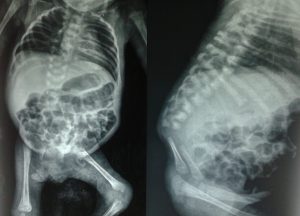 Tips for Doctors
Tips for Doctors
When delivering news about the diagnosis of a medical condition such as SA/CRS, the usual assumption is that the news is bad and that it will be upsetting for parents. A normal process of grief is expected. Certainly, a doctor should not gloss over the implications of SA/CRS. However, doctors are encouraged to be cautious about adding to these emotions by using negative labels and emphasizing dismal predictions. The news of SA/CRS may be hard for parents to hear, and doctors may be concerned about ensuring that parents fully understand the implications. The news should definitely be delivered in a factual manner, but this news needs to be balanced and accurate.
Patients and their families are very likely to remember the way doctors deliver news of medical conditions. They remember the words doctors used and the doctor’s appearance and facial expressions. They remember these details for the rest of their lives. The delivery of a diagnosis of SA/CRS can change the lives of these individuals in a few moments time, forever. Here is a recommended script of a conversation that is delivered in a way that achieves a number of goals. It is factual. It allows for normal response and processing time. It demonstrates a balanced and accurate description of the condition. It gives the parents guidance for moving forward and does not pressure them into decisions before they have had time to gather information and process information.
“I have some important information to share with you about the findings of our testing.” (pause to allow parents to process the next part of the information)
“Your baby/child (use the child’s name if you know it) has a diagnosis of sacral agenesis, also called caudal regression syndrome.” (pause to allow parents to process this information)
“You have probably never heard of this condition before. Let me tell you a few things about it.
- It is a rare condition in which the lower spine does not fully form.
- There is no known cause for this condition, so the condition is not anyone’s fault.
- There is often an impact on the form and the function of the legs and the kidneys.
- There is no indication that this condition affects your child’s brain or ability to learn.
- It does not get worse over time.
- The extent of impact may be quite obvious or quite minimal and unnoticeable, so I can’t tell you for certain what your child will be able to do or not do physically as a result of this condition, but there are certainly people living with this condition who live productive and independent lives.
- It is very hard to determine the extent of this condition before birth or sometimes even in early infancy, but I can give you some examples of what is possible.
“While I share with you some of the specifics that may occur, but I also want to emphasize that there is a great range of ways in which this condition presents. It will be important for you to make connections with other parents and with adults who have this condition to better understand what it will mean for your child. I have some resources available to help you make those connections.”
(Depending on the response the family has to this news, you may wish to recommend another appointment at the end of this conversation or even midway through to discuss more details.)
It is important to recognize that as a doctor, you may never have met a person with SA/CRS before, and your assumptions about the prognosis of this condition and the quality of life of persons living with this condition are limited to the descriptions of textbooks and articles, with those authors having their own biases related to disability. It is unlikely to have actually interacted with anyone who lives with this condition. As a doctor, you are more inclined to think about factors of medical testing, surgery, and mobility equipment than you are about a child’s high school graduation, athletic accomplishments, or artistic talent. Remember that medical factors alone do not define the quality of life of an individual with SA/CRS. Your discussion with parents should include the following:
- Encourage parents to explore connections with other parents and with adults who live with this condition. Point them to iSACRA as a resource.
- Balance explanations of the most severe possibilities with the very real possibilities of living a productive and independent life with this condition. Even when the condition is severe, it does not preclude productivity and independence.
- Ensure that the descriptions you provide of the outcomes of this condition are accurate. Some doctors have told parents that the child will never sit up or breathe independently. In a membership of nearly 1,000 individuals within iSACRA, we have never found this to be the case.
- Ask the parents for questions. It is very typical for parents not to really hear much of what is said after the first information is delivered. Parents may key in on only one or two words that strike fear in them.
- Let parents know that you are aware this information takes time to process and recommend a follow-up to talk more about the diagnosis when they have had more time to process it.
- Let the parents know that there is a lot of outdated information about this condition on the Internet. Recommend that they not rely on this information to make decisions about their child.
